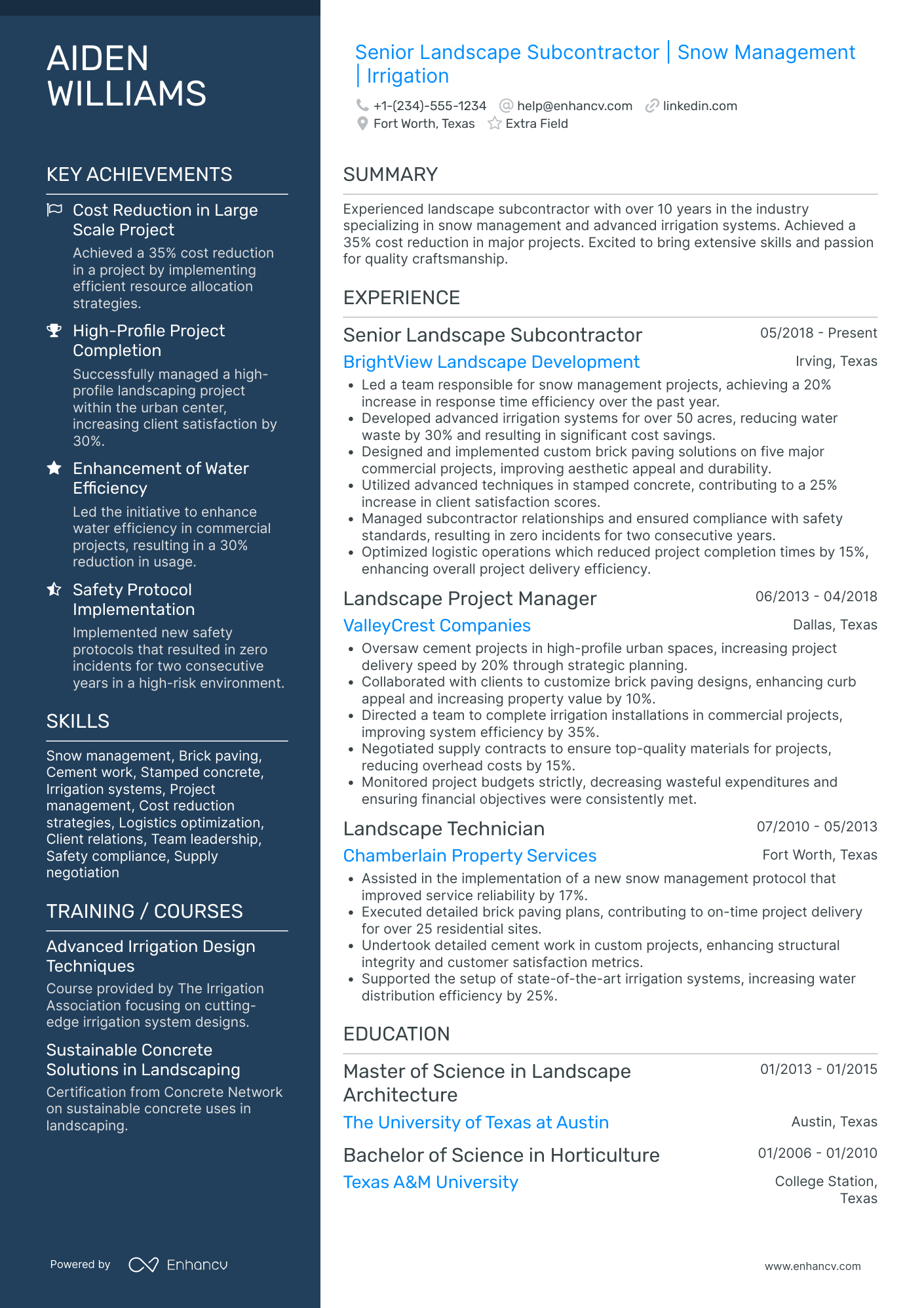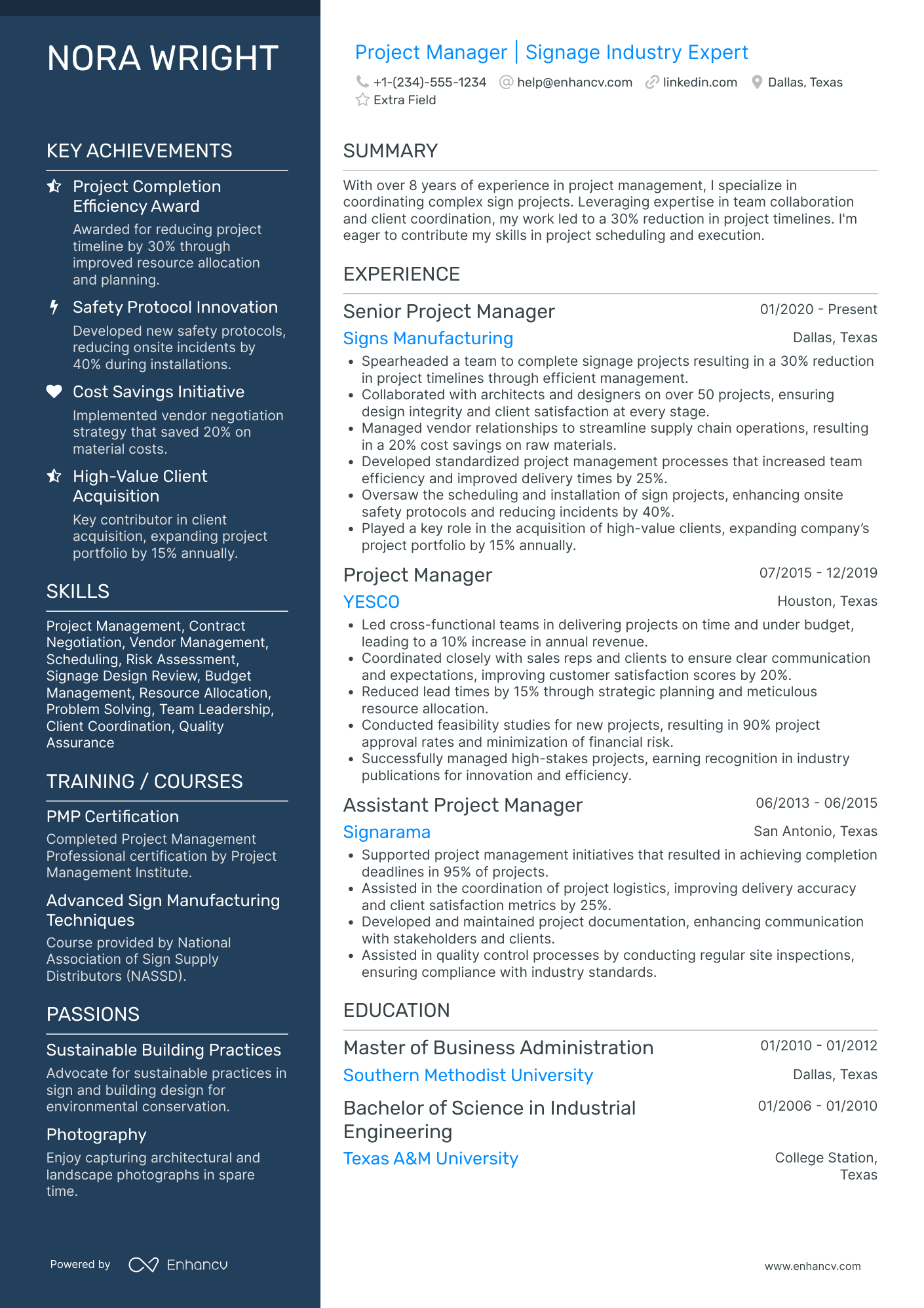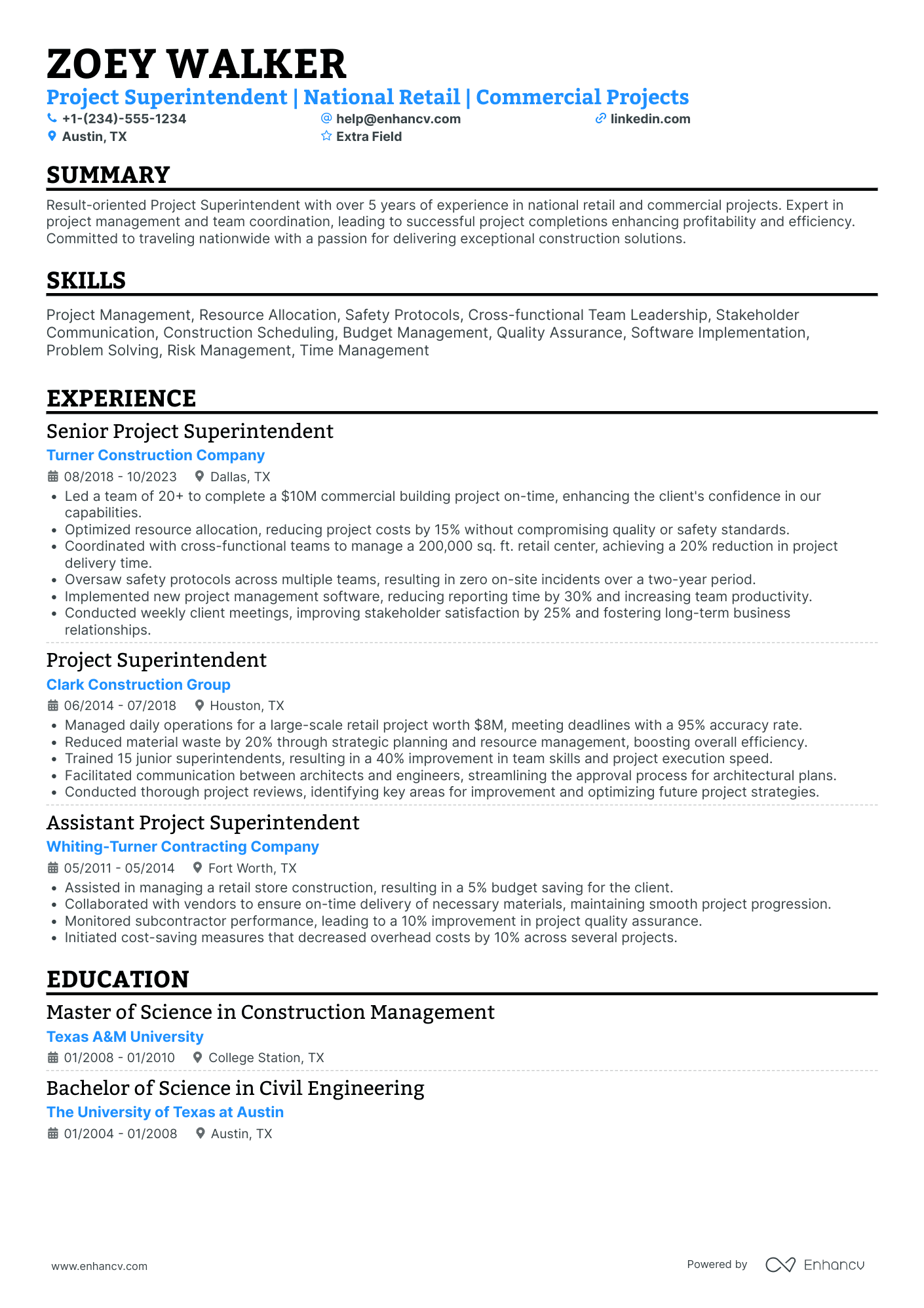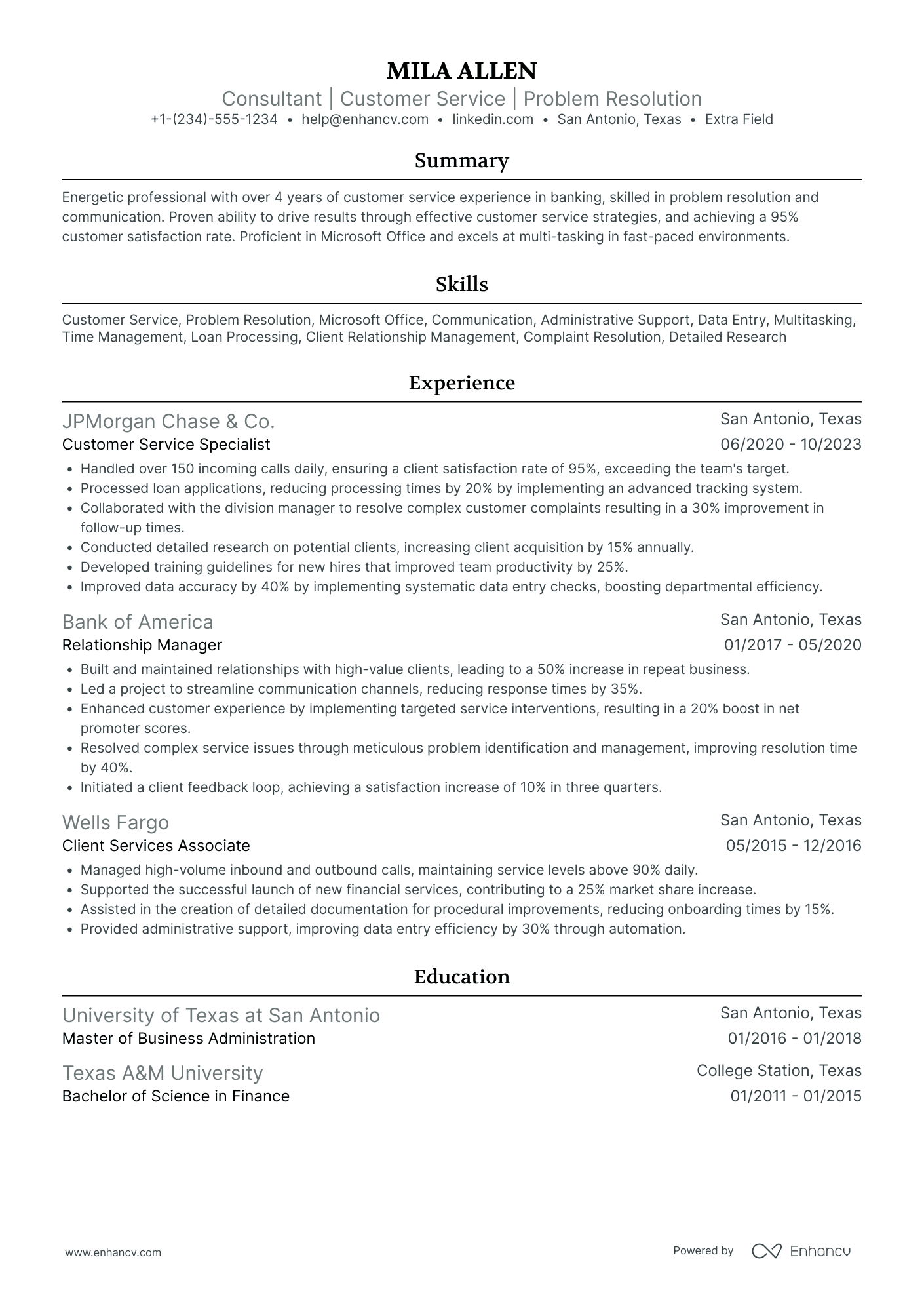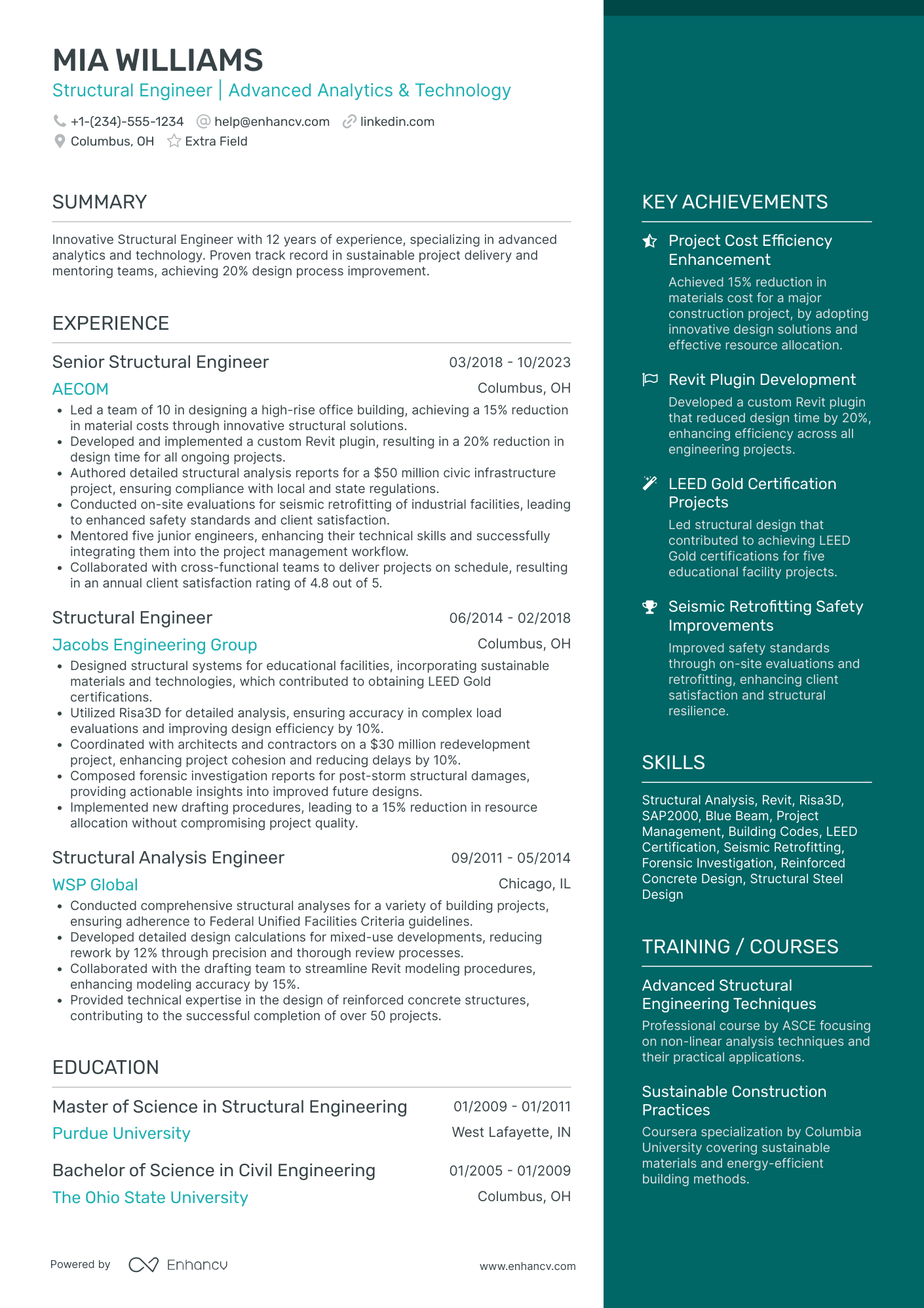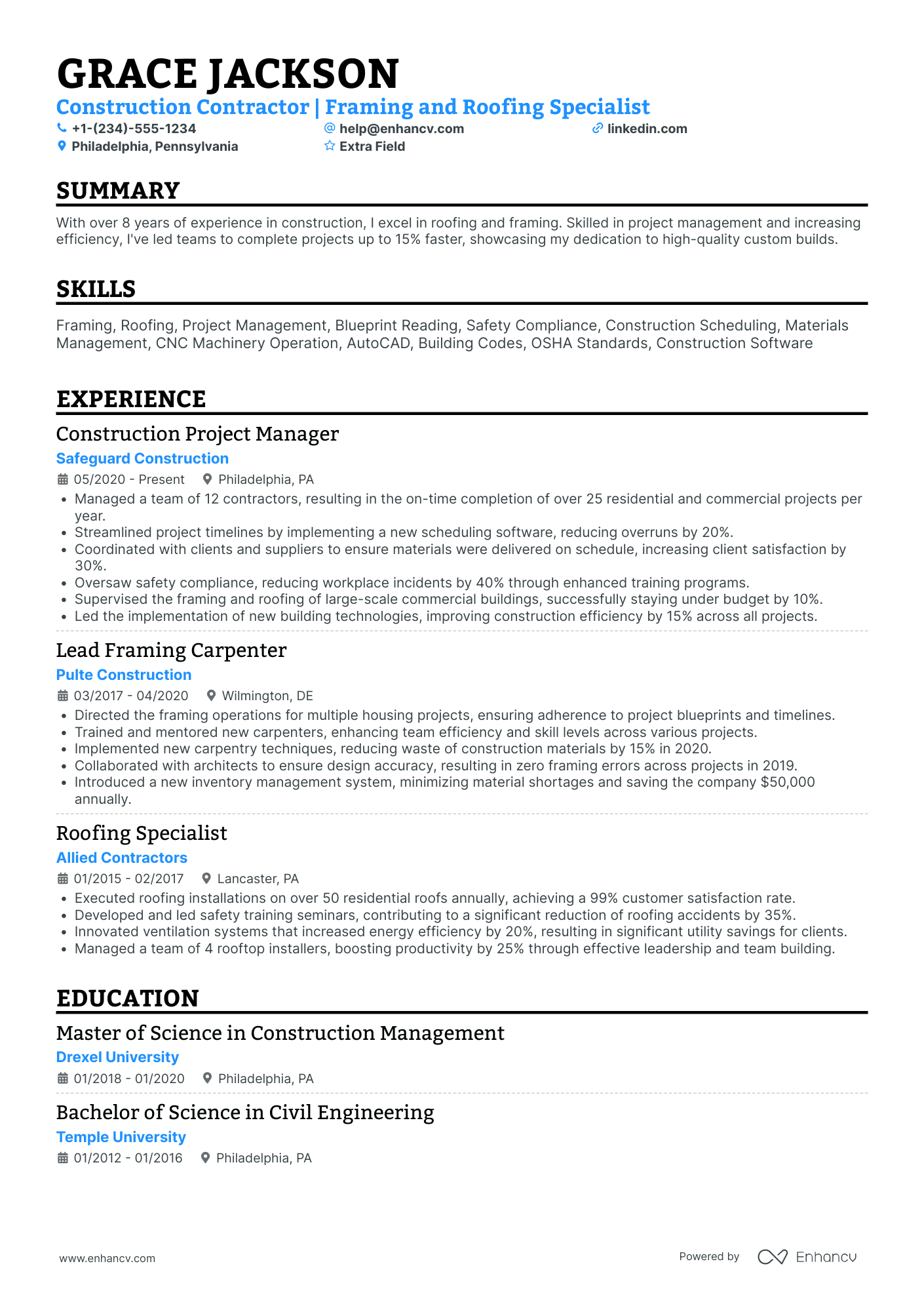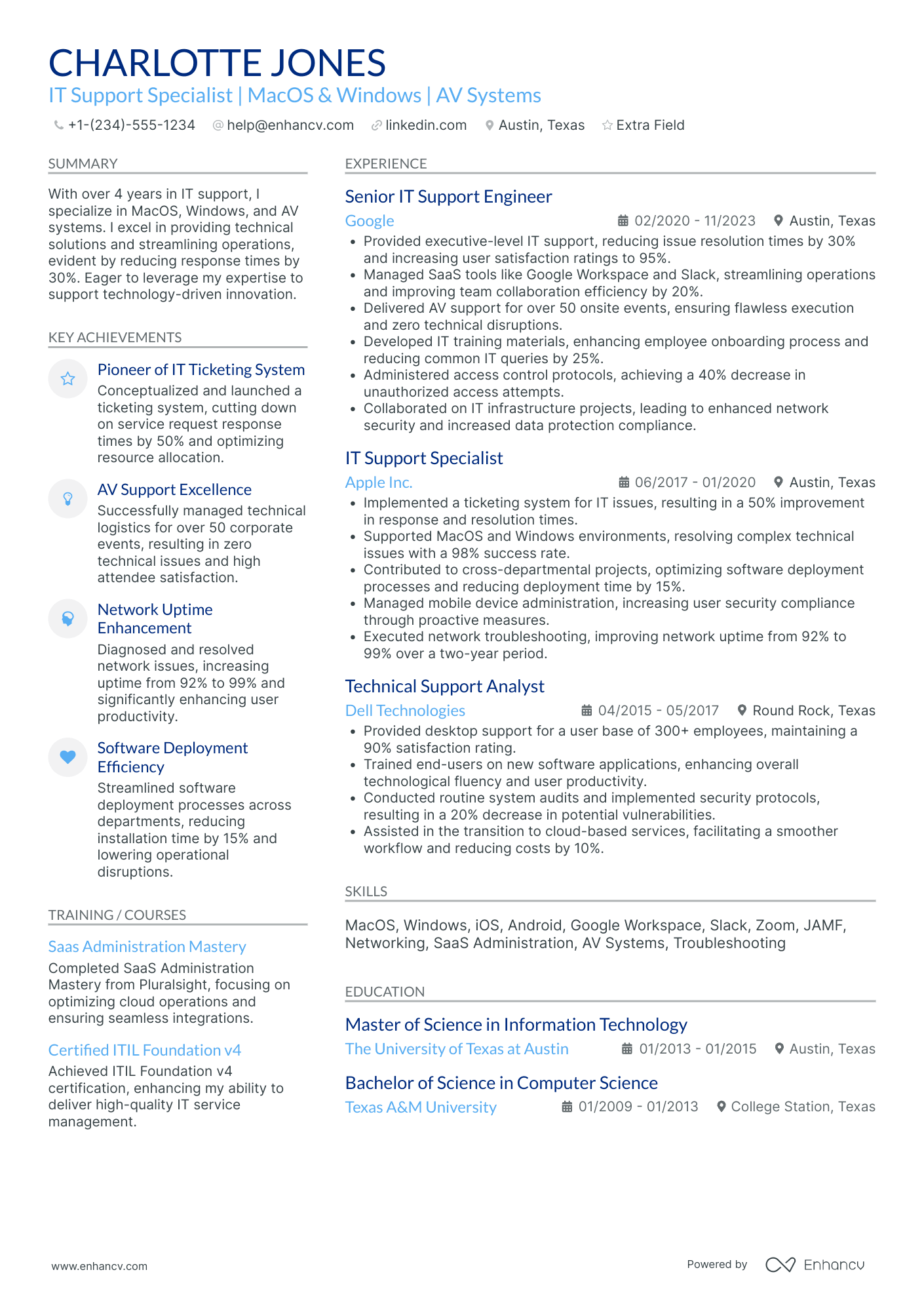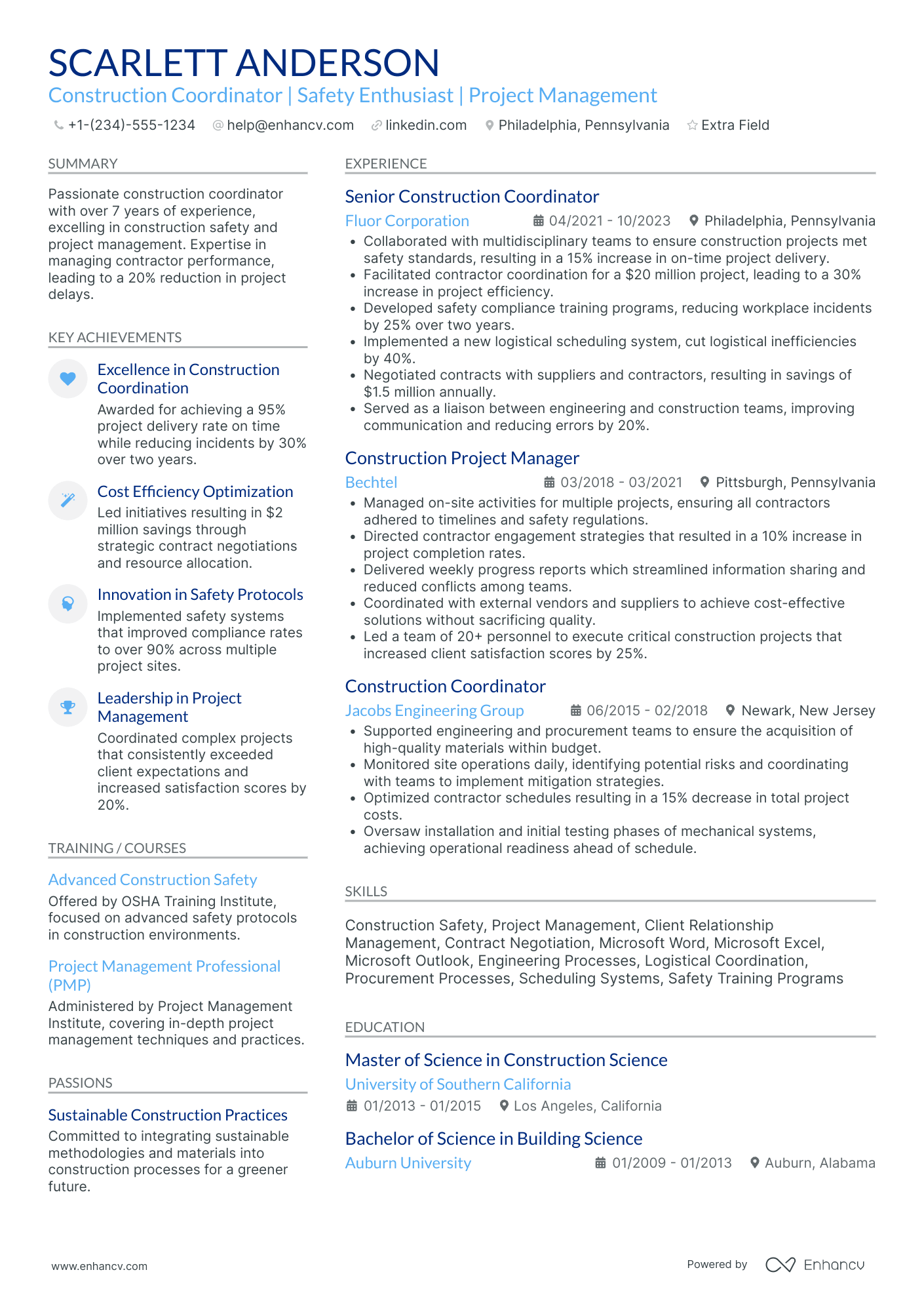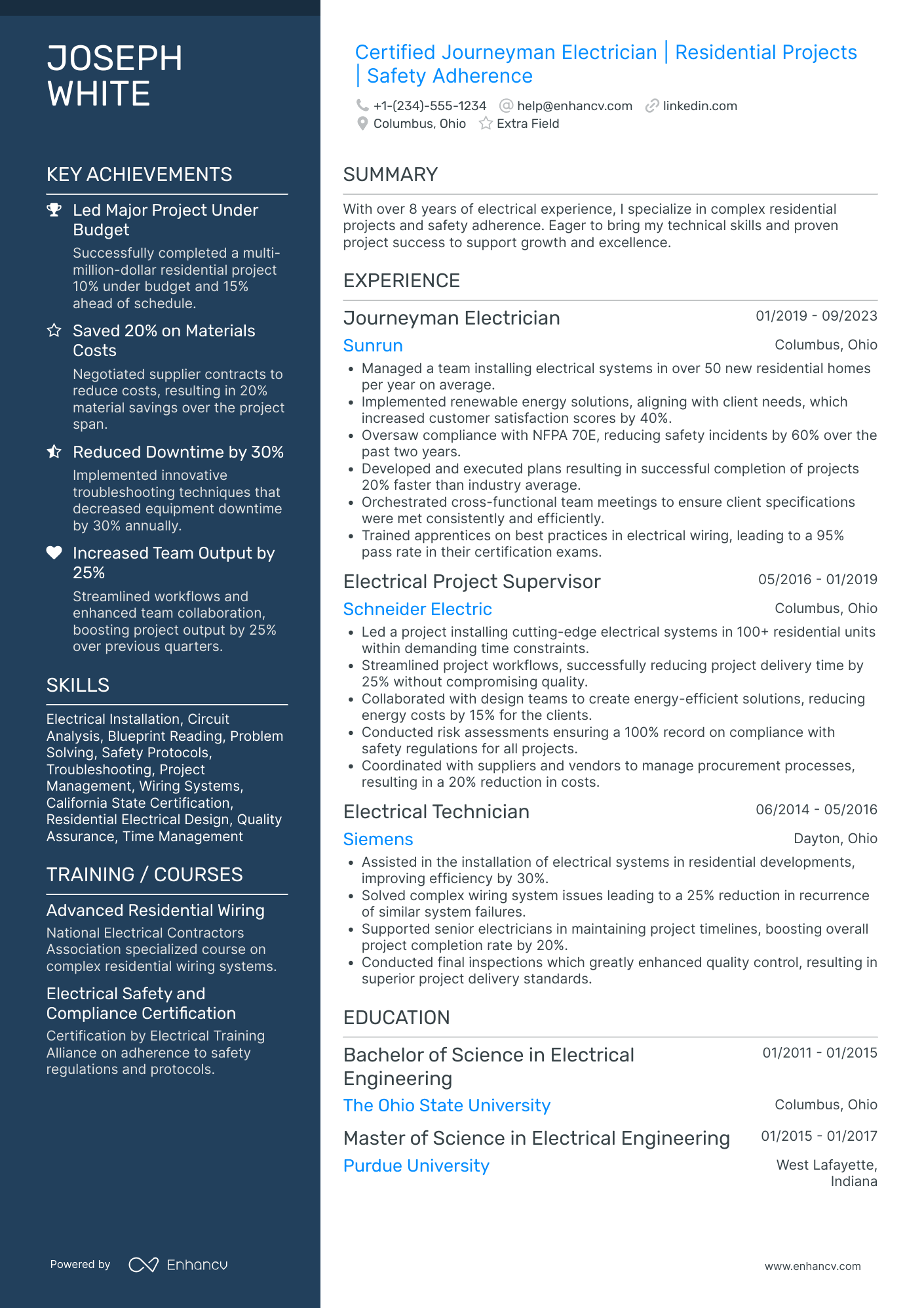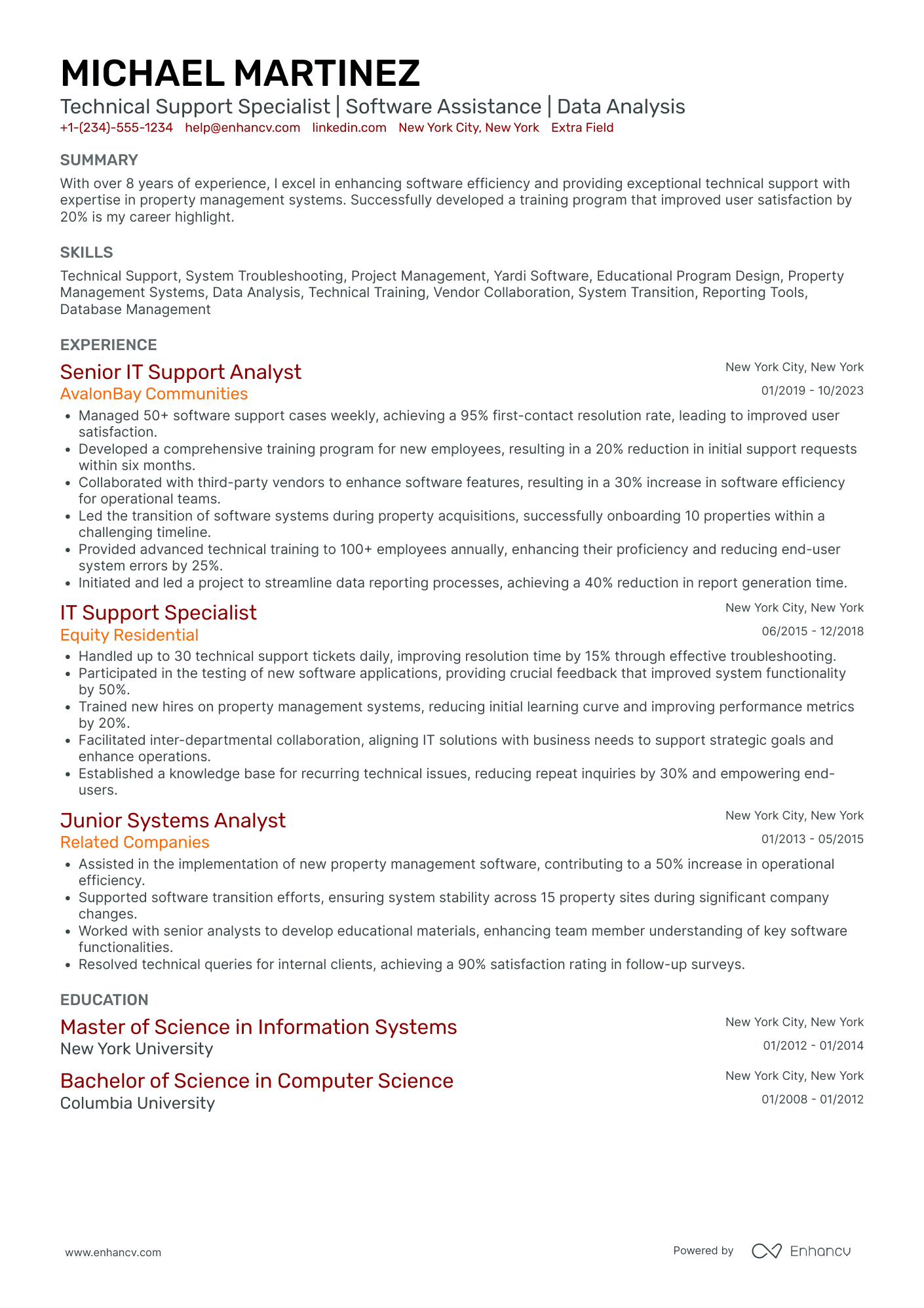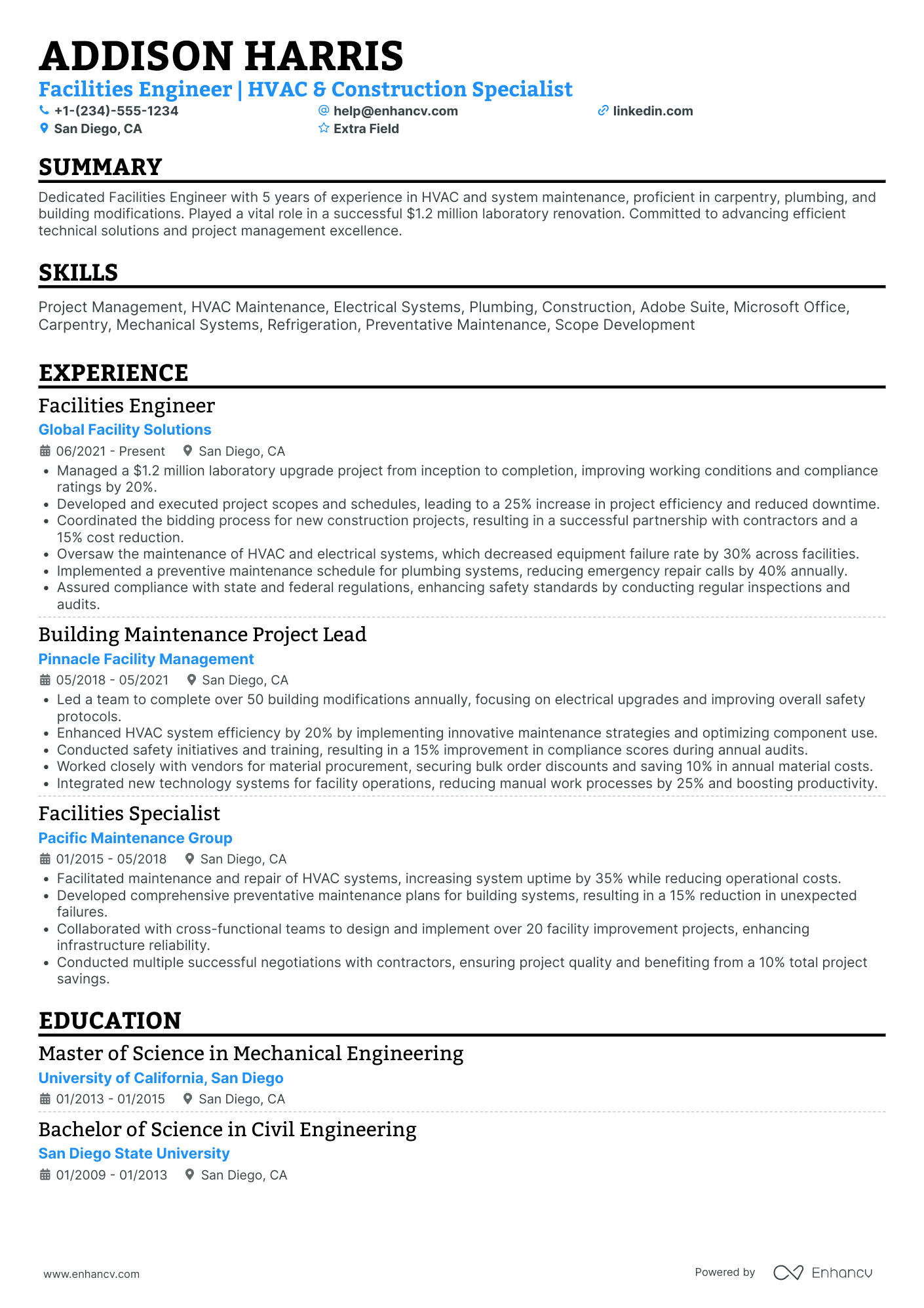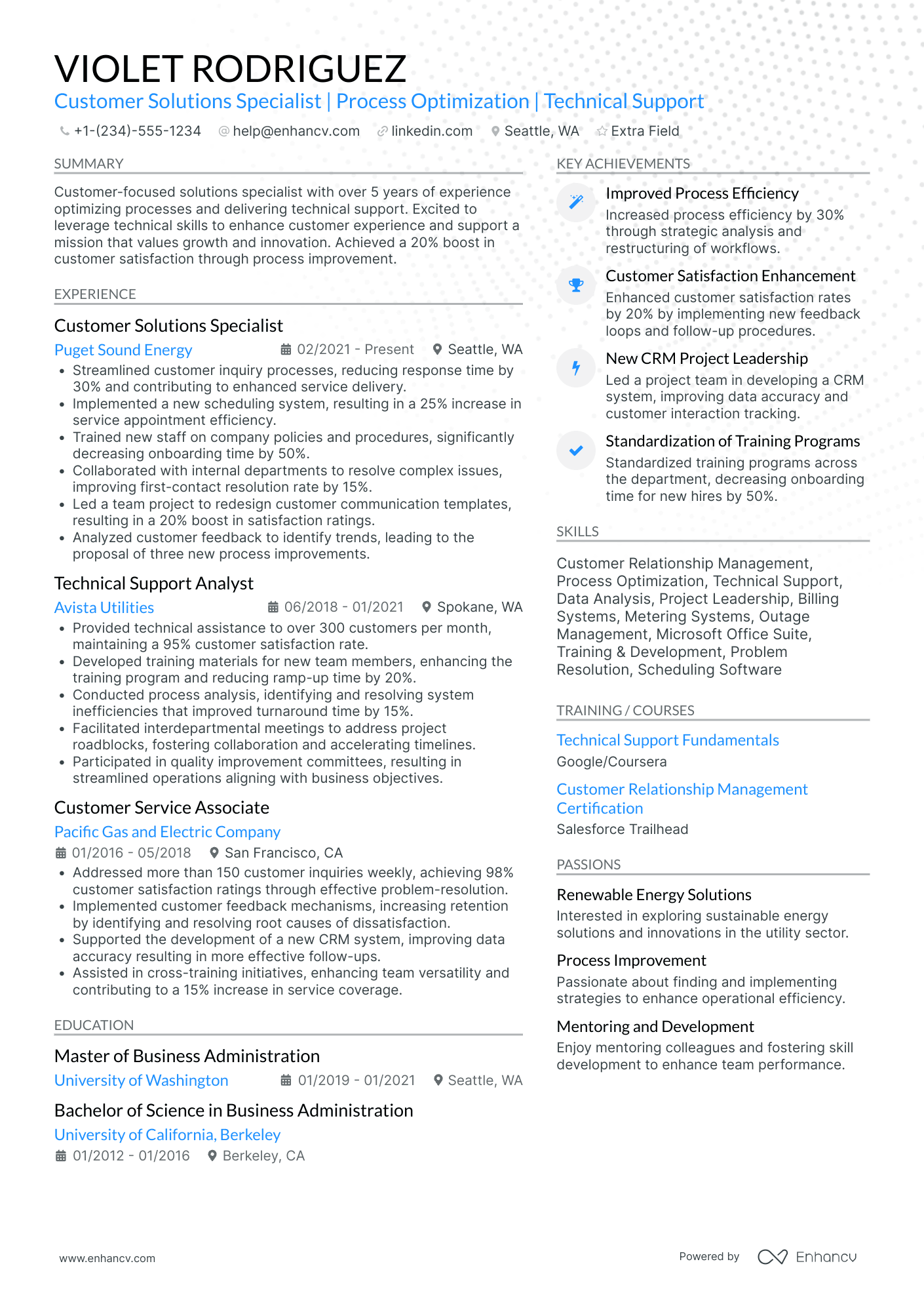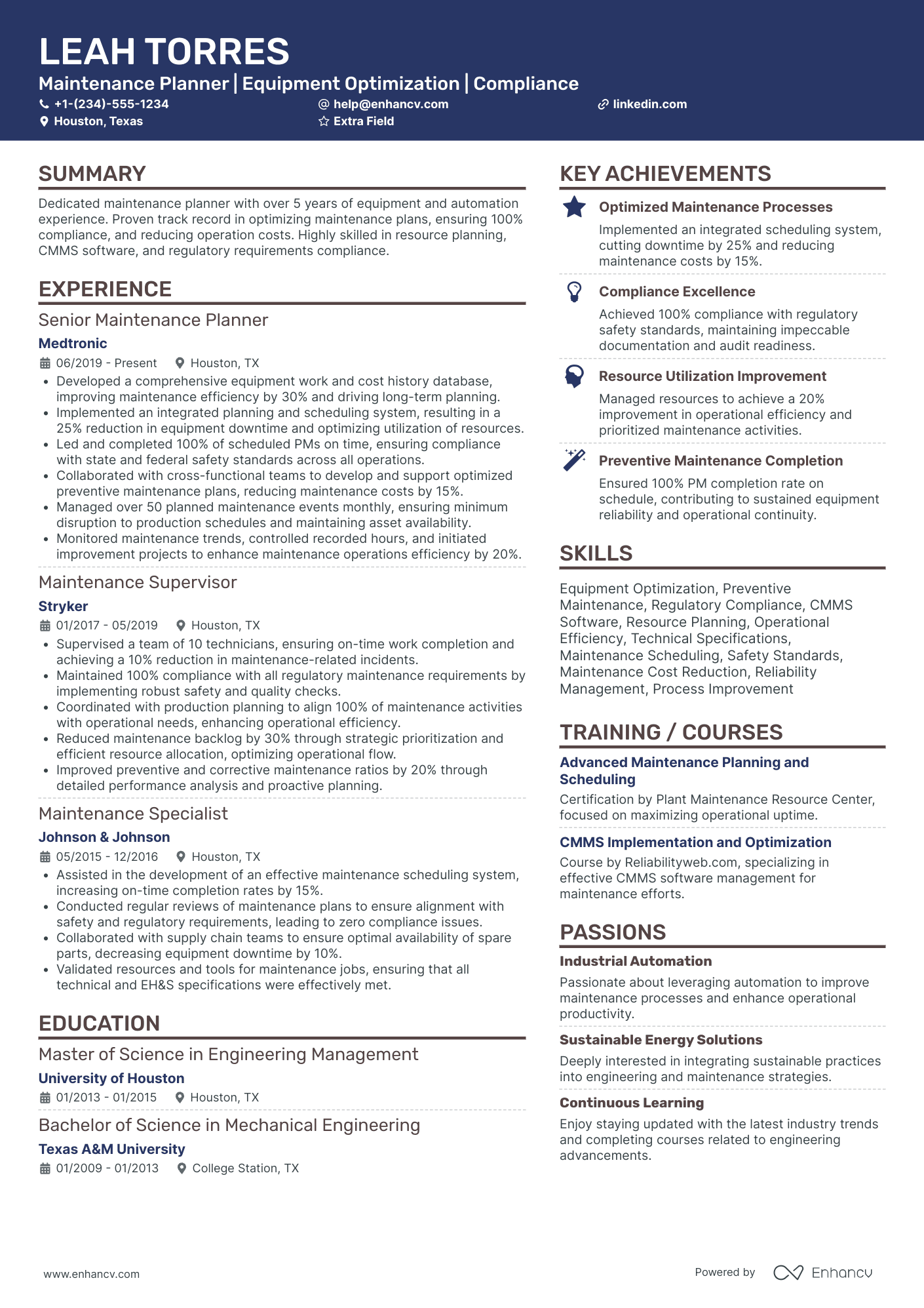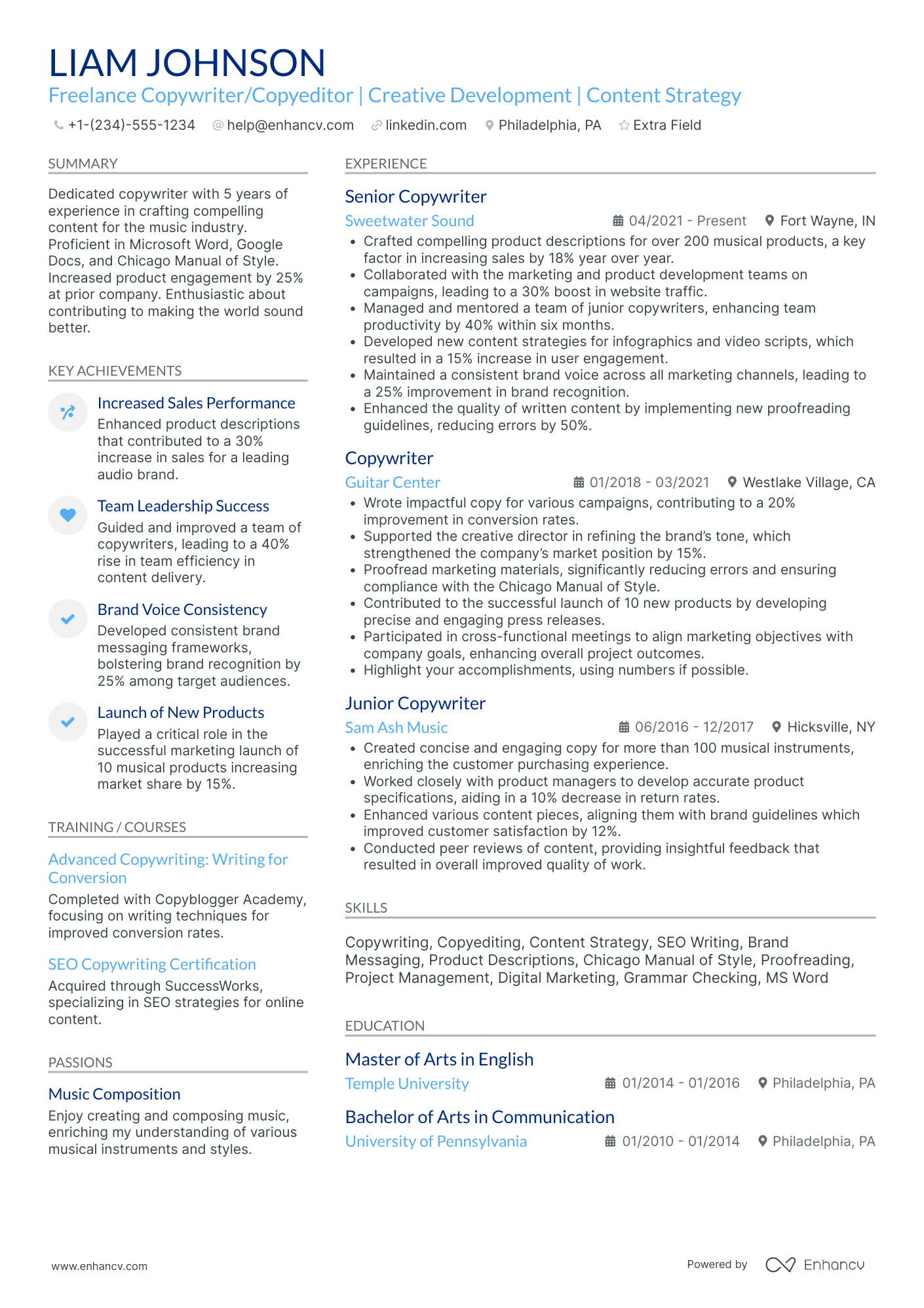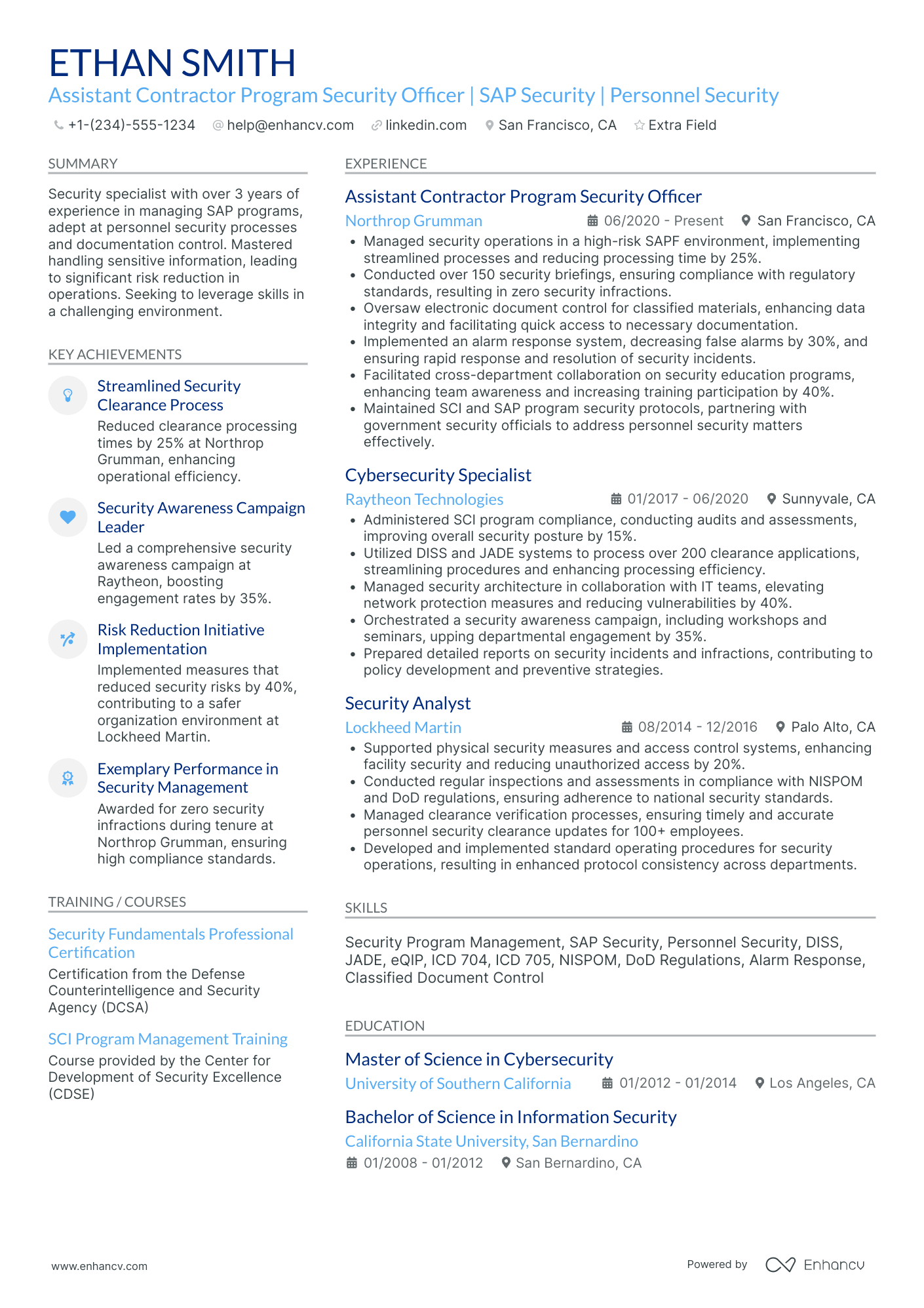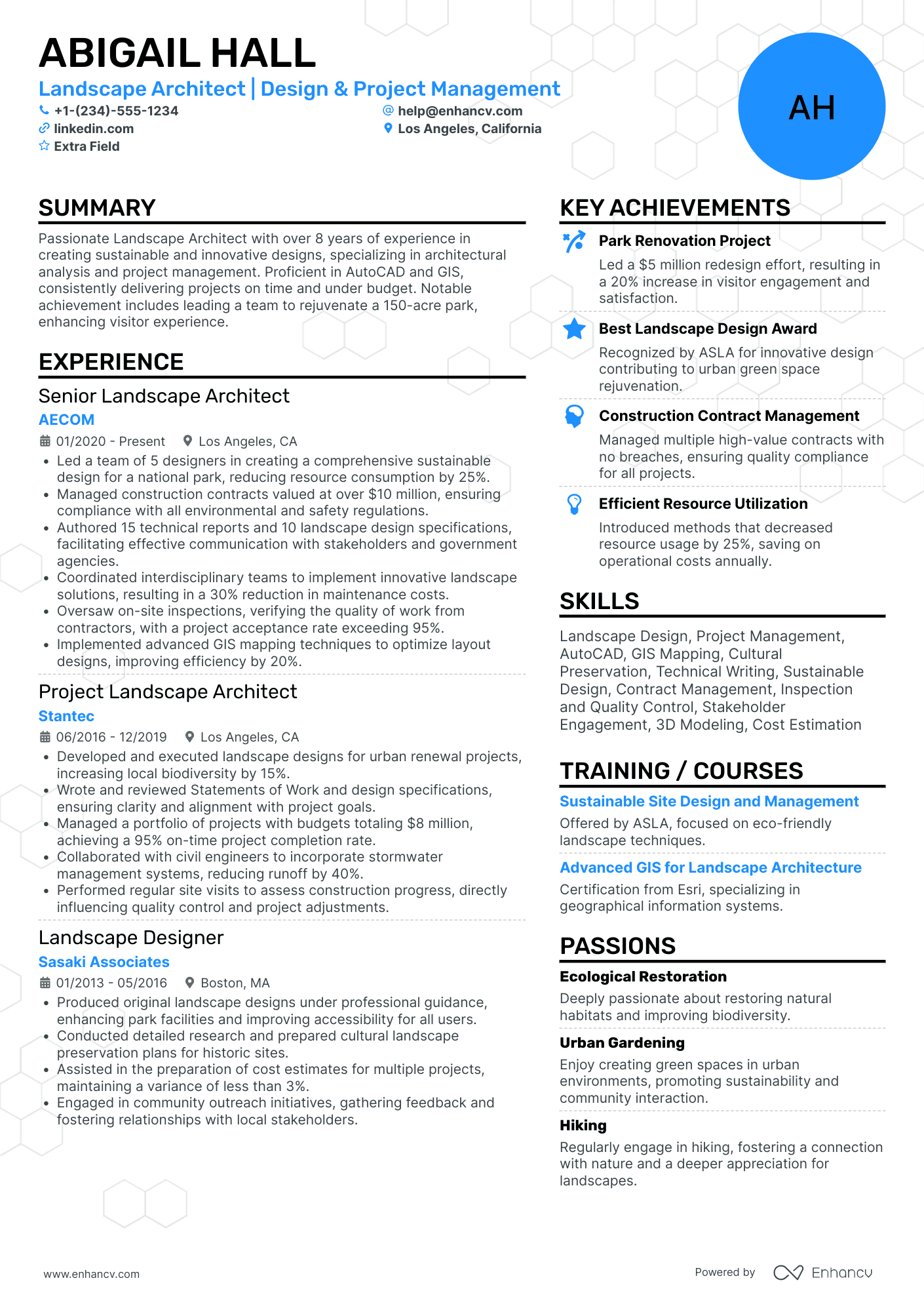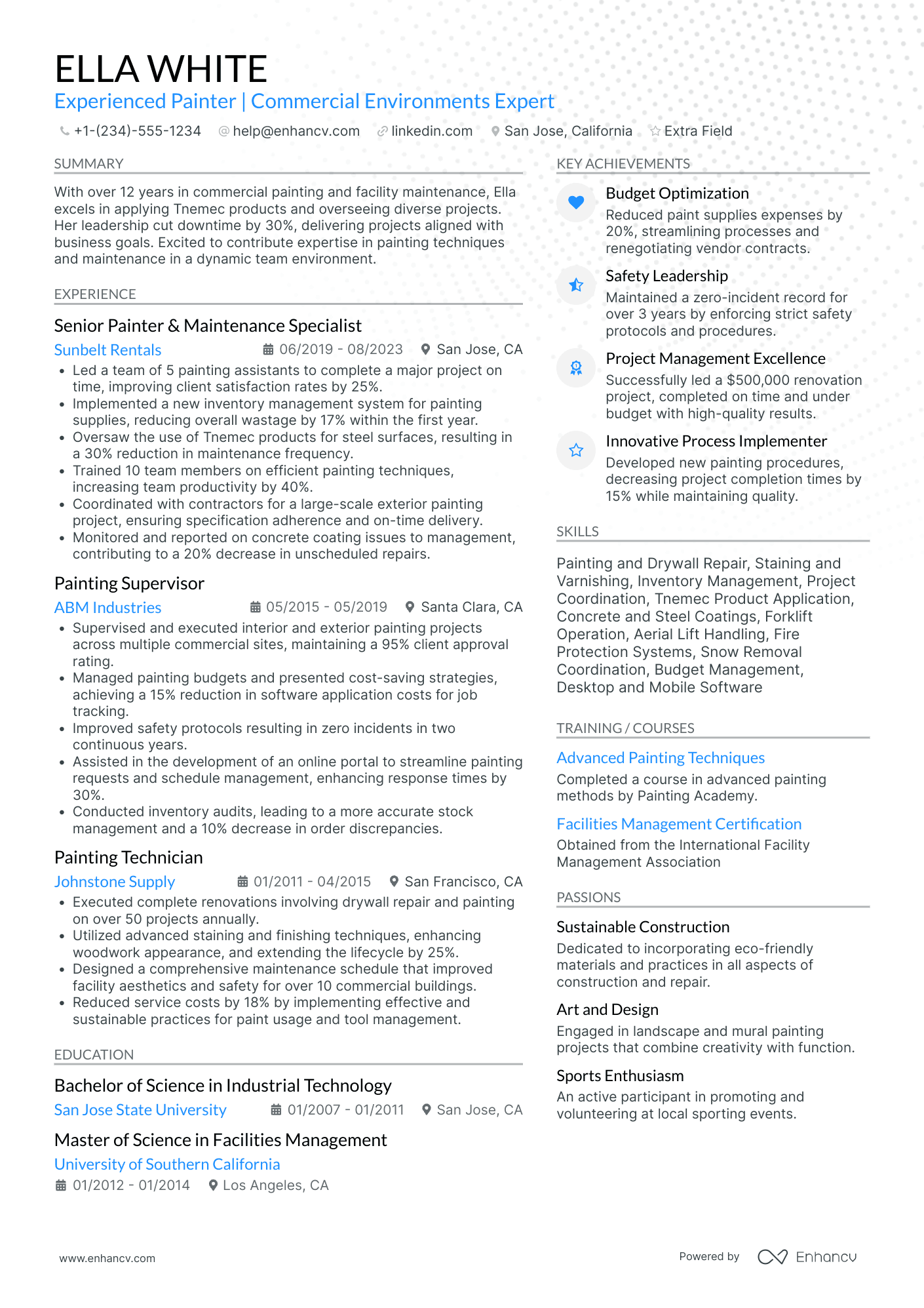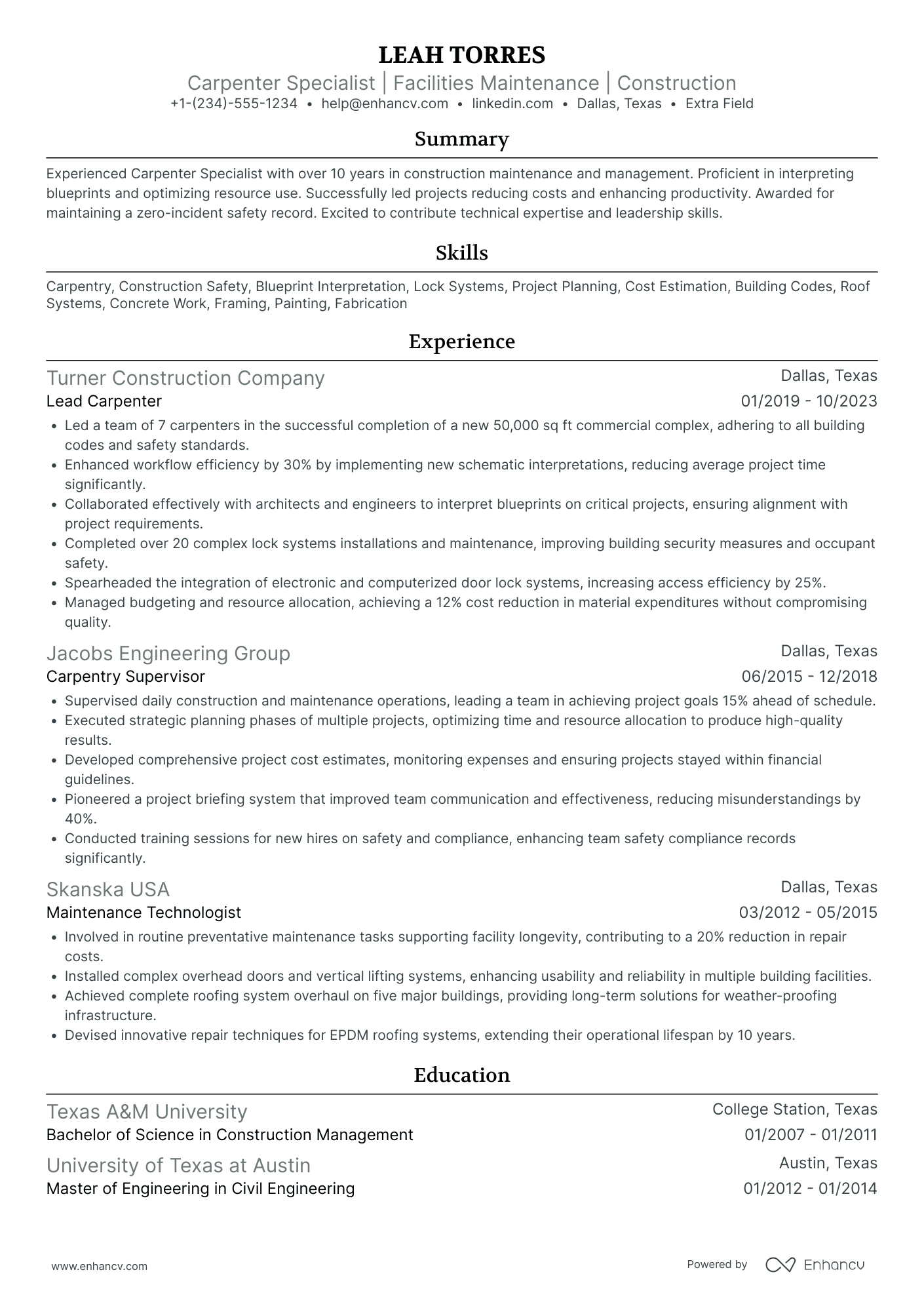In the competitive field of building and renovation, your contractor resume can be a powerful instrument in your professional “toolbox” that gains the trust of clients and hiring managers.
This Houzz Industry Report suggests that homeowners value experience the most when they hire a contractor. So how you present your experience and professional skills can give you a competitive edge over other applicants.
In this guide, we’ll go over the key components that make a contractor resume stand out in the blue-collar workforce.
Key takeaways
- Use reverse-chronological order to list your contractor experience.
- Quantify your accomplishments with metrics (e.g. cost-saving, budgeting).
- Resort to a “functional” resume format if you lack experience.
- List your training and certification with accurate dates of completion.
- Include a career progression if you’re applying for a higher-level role.
Let’s go over the contractor resume example we have prepared for you and analyze in detail what makes it effective.
Contractor Resume Sample
We have crafted a resume sample of a contractor with eight years of professional experience. Pay particular attention to how the information in the experience section is presented.
Gregory Greenwood
General Contractor
(512) 555-0198 | gregory.greenwood@enhancv.com | @LinkedIn | Austin, TX
Summary
Dedicated and detail-oriented contractor with over five years of experience in home improvement, property maintenance, and renovations. Skilled in carpentry, plumbing, and electrical work, with a proven track record of delivering high-quality projects on time and within budget. Known for exceptional communication skills and ensuring customer satisfaction through collaborative project planning and execution.
Experience
Residential Renovation Contractor
Renovate Now, LLC – Austin, TX
April 2020 – Present
- Planned and executed over 50 residential renovation projects, including kitchen remodels, flooring installation, and roofing repairs.
- Managing project budgets ranging from $5,000 to $100,000, achieving cost savings of up to 15% by negotiating with suppliers.
- Supervising subcontractors and work crews, ensuring adherence to safety regulations and timely project completion.
- Collaborating with clients to understand their needs and providing clear cost estimates and timelines.
- Resolving on-site issues, minimizing delays, and maintaining 95% or higher client satisfaction scores.
Junior Contractor
Fix-It Pros – Denver, CO
June 2017 – March 2020
- Assisted in property maintenance and renovations for residential and small commercial buildings.
- Performed hands-on tasks such as drywall installation, painting, and basic electrical work under supervision.
- Developed skills in reading blueprints and preparing worksite materials.
- Contributed to team efforts, resulting in a 20% increase in annual project completion rates.
Certifications
- CPR and First Aid Certified, 2022
- OSHA 30-Hour Certification, 2021
- EPA Lead-Safe Certified Renovator, 2020
Education
Degree in Construction and Building Technology
Denver Community College – Denver, CO
Graduated: May 2017
Skills
- Carpentry
- Plumbing
- Electrical work
- Blueprint interpretation
- Project budgeting
- Material sourcing
Languages
- English (Native)
- Spanish (Conversational)
How to Format a Contractor Resume
One of the first details about your resume that a hiring manager or a client will notice is how it's formatted. In other words, the general appearance and structure of your resume.
In the past, you might have heard that resume format was important due to how ATS (applicant tracking systems) worked. Rest assured that this is no longer the case.
Recent advancements in AI have made the majority of ATS software quite good at accurately processing and sorting out applicant resumes. This means that your primary goal in formatting your resume is to make it easy for hiring managers to scan and read.
Recommended resume format for contractors
Reverse-chronological resume: As mentioned above, most clients value experience the most when hiring a contractor. So the best way to present yours is in this widely accepted and convenient format.
This way they can easily see your most recent projects, conveying that you’re transparent and confident about your workmanship.
Resume design tips
- Resume margins: Stick to margins between 0.5 to 1 inch on each side. This improves readability and gives your resume an orderly feel to it.
- Colors: Your resume colors should convey the seriousness and professionalism expected from a contractor. Go for black and white but don’t be afraid to use subtle accent colors like gray and darker shades of blue.
- Fonts: Classic resume fonts such as Arial, Calibri, or Times New Roman, in 10–12 size, will suffice.
- Length: In most cases, clients and hiring managers would be interested in your most recent experience so aim for a one-page resume. Still, it’s okay to opt for two pages if you have over a decade of experience and you’d like to show that you’re a seasoned contractor.
- Columns: For contractors, the one-page format best works with two columns. One for experience, and one for skills and certifications.
- Resume templates: To save time and make sure all these details are perfect, check Enhancv’s ready-made templates.
Contact information
- Your phone number, email address, LinkedIn profile, and city/state location should be clearly displayed in the header.
- A full mailing address and resume photo are unnecessary and can detract from your application.
Forget your ATS concerns. Remember that what counts as an ATS-friendly resume is one with accurate dates and keywords that meet the job description. Rest assured that creative resume designs and length won’t be a problem.
File formatting
- If you’re wondering whether to go for a resume in PDF or doc, keep in mind PDF is the most widely used format. It locks the formatting and preserves it across all devices.
- Also, name the file in a way that makes it easy to search for, e.g., Gregory_Greenwood_Contractor_Resume.pdf
Top sections for a contractor resume
Now let’s roll out the structure of your resume. These are the main sections you should focus on:
- Contact Information
- Resume Summary or Objective
- Work Experience
- Skills
- Training and Certification
- Education
- Languages
Do you already have a resume? Try our AI-powered resume checker!
Is your resume good enough?
Drop your resume here or choose a file. PDF & DOCX only. Max 2MB file size.
We’ll discuss each resume section in more detail below.
How to Write Your Contractor Resume Experience
Let’s go over the key elements that you should include in your resume experience.
- List the roles you took on starting with your most recent one and outline the employment periods.
- Instead of listing your main responsibilities, make your resume stand out by focusing on your accomplishments using action verbs and numbers.
- Mention specific tools or technologies you have experience with.
- Any notable projects you’ve completed? Detail the scope, budget, or results achieved.
Why resume tailoring is important for recruiters
Don’t underestimate the importance of tailoring your resume to the role description. It’s an often neglected aspect of resume writing that can give you a serious advantage over other candidates.
Here’s what it does for you:
- Demonstrates your experience meets the job requirements.
- Conveys that you understand the employer’s/client’s priorities.
- Significantly increases your chances of passing ATS screening by using relevant keywords from the job description.
- Makes your resume more compelling by focusing on measurable achievements.
To better illustrate this approach, let’s use a real-world job description.
General Contractor
Company Profile
HomeRevive Construction is a leading home improvement and renovation company specializing in delivering high-quality residential and commercial construction projects. With over 15 years of experience, we pride ourselves on providing innovative solutions, exceptional craftsmanship, and unparalleled customer satisfaction.
Responsibilities
- Plan, coordinate, and oversee renovation and construction projects from start to finish, ensuring completion within deadlines and budgets.
- Supervise teams of subcontractors and workers, assigning tasks and monitoring progress to maintain quality standards.
- Develop project timelines, budgets, and schedules, providing regular updates to clients and stakeholders.
- Conduct on-site inspections to ensure compliance with safety regulations, building codes, and quality benchmarks.
- Collaborate with clients to define project scope, requirements, and expectations while addressing concerns throughout the project.
- Source and procure materials, negotiating with suppliers to achieve cost-effective solutions without compromising quality.
- Resolve on-site issues, delays, or challenges promptly to keep projects running smoothly and maintain client satisfaction.
- Maintain accurate records of project progress, expenses, and reports for stakeholders and company management.
Requirements
- Proven experience as a contractor or in a similar role, with at least 5 years in residential or commercial renovations.
- Proficient in project management tools such as AutoCAD, Procore, or Buildertrend.
- Strong knowledge of construction techniques, safety standards, and local building codes.
- Excellent communication and organizational skills, with a focus on client satisfaction.
- Certification in OSHA 30-Hour Construction Safety or similar safety training.
- Bachelor’s degree in Construction Management or a related field is a plus but not required.
- Ability to manage multiple projects simultaneously while maintaining attention to detail.
After going over what is expected of the general contractor role, we can focus on tailoring the work experience entry to match it.
Here’s an example:
- •Planned and managed over 50 renovation and construction projects, consistently delivering on time and under budget by up to 15%.
- •Supervise teams of subcontractors and workers, ensuring high-quality standards and strict adherence to safety regulations and building codes.
- •Develop project timelines, budgets, and schedules, providing regular updates to clients and stakeholders to maintain transparency.
- •Conduct on-site inspections to identify and resolve issues, maintaining a 95% client satisfaction rate.
- •Assisted in the planning and execution of residential renovation projects, gaining hands-on experience with project scheduling and team coordination.
- •Supported subcontractor teams in completing tasks efficiently while adhering to safety regulations.
- •Coordinated with suppliers and managed material procurement, optimizing project budgets.
- •Collaborated with senior contractors to resolve on-site challenges, helping to minimize project delays.
As you can see, we used action verbs and specific examples to target the highlighted parts from the job description. This approach gives you an advantage because it will enrich your resume with relevant keywords and make it ATS-friendly.
Now let’s take a look at how to enhance your resume even further by using numbers.
How to quantify your experience on a resume
One of the most impactful things you can do when outlining your contractor experience is to quantify it using numbers.
Mention project completion timelines, project budgeting, cost savings, and client satisfaction rates. This demonstrates your competence and makes your work compelling and measurable.
Here are some examples of how quantified accomplishments look on your resume:
- Increased client satisfaction by completing 95% of projects ahead of schedule and within budget over a two-year period.
- Reduced material costs by 15% through efficient supplier negotiations and bulk purchasing strategies.
- Managed 10+ subcontractors per project, ensuring 100% compliance with safety regulations and local building codes.
- Completed renovations on properties totaling over 20,000 square feet, resulting in a 25% average property value increase.
- Boosted team productivity by implementing new workflow processes, leading to a 30% reduction in project timelines.
But what if you don’t have any previous experience? Don’t worry, we got you covered!
How Do I Write a Contractor Resume with No Experience?
A thoughtfully prepared resume is even more important if you’re just starting out as an apprentice or a junior contractor and don’t have significant experience in the field.
Lucky for you, there are different resume types. In this case, focus on building what is usually referred to as a functional resume.
A functional resume focuses on hard skills and qualifications. It’s the perfect approach for entry-level roles.
What to include on your functional contractor resume
- Leverage your technical abilities (carpentry, electrical work, tool usage, etc.) to make up for lacking in-field experience.
- Shift the focus away from your lack of experience through a resume objective about your professional goals.
- List relevant certificates like OSHA 10 or 30-Hour Training, and First Aid/CPR.
- Outline your construction-related coursework, vocational training, or related degrees.
- Hands-on experience from volunteering or a personal project is welcome, too.
- Additional languages you know will be appreciated, especially if relevant to your local job market.
- Add up to three professional or educational references.
Tips for writing objectives
As a newcomer to the building and renovation sector, use resume objectives to convey your eagerness to do great work as a contractor.
Here’s how:
- Explain in one to two sentences about your contractor career goals.
- Mention the skills you aim to apply in the role.
- Express your genuine interest in the industry.
Here’s a proper objective example:
But what if you’re currently an apprentice or a junior contractor, and you’re confident it’s time to move up the ladder as a general contractor? The next section is for you.
Optimize your resume summary and objective for ATS
Drop your resume here or choose a file.
PDF & DOCX only. Max 2MB file size.
How to Show Career Progression on a General Contractor Resume
Your experience gives you a solid foundation. So it’s just a matter of framing it the right way to convince hiring managers that you’ve got what it takes to fill the role.
- Make your case of why you’re capable of taking on a higher-ranking role by listing instances where you supervised teams or subcontractors.
- Mention how you handled project planning, budgeting, and execution.
- Resort to numbers to show how your input had a positive impact on timelines, client satisfaction, and costs.
- List your technical skills critical for the role.
- Mention any relevant prior roles—experience as a junior contractor, foreman, or project manager shows promise in progressing further.
- Back up your qualifications with your advanced certificates.
Now let’s take a look at the key skills that make a good property renovation contractor.
How to List Your Hard and Soft Skills on Your Resume
In order to demonstrate your suitability for the role, you need to meet the job description with the right set of skills.
If you aren't familiar with resume-building lingo, just remember that “hard skills” refers to profession-specific expertise. “Soft skills” on the other hand, encompass personal attributes that affect how you work and communicate with coworkers and clients.
For contractors, a dedicated skills section with technical abilities is a must. Make sure to spell them correctly to make your application ATS-friendly.
Here’s what hiring managers usually look for in candidates:
Best hard skills for your contractor resume
- AutoCAD
- SketchUp
- Revit
- Microsoft Project
- Procore
- Buildertrend
- Bluebeam Revu
- PlanGrid
- Sage 100 Contractor
- Trimble Field Link
- Rhino 3D
- Primavera P6
- OSHA Safety Software
- Fieldwire
- Autodesk BIM 360
- QuickBooks Contractor Edition
- SmartBid
- HeavyBid
- JobNimbus
- Fusion 360
Some candidates are tempted to overexaggerate their set of skills or downright lie about it. But lying on your resume is never a good idea because this is something hiring managers easily verify later on in the hiring process.
There’s no need to have a dedicated section for soft skills on your resume. Instead, weave them naturally into your resume summary and work experience descriptions.
Still, let’s go over an extended list of interpersonal skills recruiters usually appreciate in contractors.
Best soft skills for your contractor resume
- Communication
- Leadership
- Time management
- Problem-solving
- Teamwork
- Attention to detail
- Client relationship management
- Decision-making
- Adaptability
- Negotiation
- Conflict resolution
- Organizational
- Multi-tasking
- Stress management
- Collaboration
- Creative thinking
- Analytical thinking
- Accountability
Describing how you acquired your professional skills through training and certification is another aspect of building an attention-grabbing resume. This brings us to our next point.
How to List Your Certifications and Education on a Resume
For a contractor, certifications generally take priority over education on a resume. They demonstrate compliance with industry standards, fulfill job requirements, and reassure employers of your technical qualifications.
Listing them is pretty straightforward. Also, include years of completion and the organizations you acquired them through.
Here’s an example:
We also took the time to research what certifications stand out the most in your line of work.
Best certifications for your contractor resume
Certificates might take priority but your educational background can still provide tremendous value to your contractor resume.
Here’s how to structure your education section:
- Specify the degree or diploma earned.
- Write the full name of the educational institution.
- Include your GPA score (only if above 3.5).
- Add attendance period—no need to list months.
- Mention your major or relevant coursework.
Let’s take a look at what that would look like on a resume.
- •Completed coursework in Construction Safety and Project Management
This is a great example because the information is neatly structured, and the listed degree and coursework align with any contractor role.
Education sure does add value to your resume but there’s a section where you can show recruiters exactly what makes you the best candidate for the role.
How to Write Your Contractor Resume Summary
Your resume summary should be a precise snapshot of what makes you the perfect candidate for the job. It should immediately grab the employer’s attention with a strong statement backed up by achievements.
Here’s what to include in your summary of three to five sentences:
- Professional experience: Number of years you’ve worked in the field and types of projects you’ve completed.
- Specialized skills: Key competencies such as project management, blueprint interpretation, or other specific technical abilities.
- Achievements: Quantify your accomplishments with numbers (projects completed, cost savings achieved, client satisfaction rate).
- Value to employer: A clear statement on how your expertise can contribute to the employer’s goals.
Let’s examine a well-written example:
Here’s what makes this resume summary great:
- It’s concise—three sentences that pack a punch.
- Uses action-oriented language, highlighting how impact was made.
- Quantified achievements—including metrics to make accomplishments tangible.
- Tailored to the specific requirements of the contractor role.
We went over the key elements of a contractor’s work resume. But is there anything else that could make your resume great and become an even more desirable candidate?
Well, here are a few examples.
Additional Sections for a Contractor Resume
Including additional sections in your resume can be beneficial, even if you are an experienced contractor.
It’s a great way to provide more context about your professional competencies and give employers extra reasons to choose you over other candidates.
Consider the following:
- Volunteer work: Community involvement where you applied construction skills.
- Projects: Details about scope, budget, and results.
- Hobbies and interests: Only those that tie into your work, like woodworking or sustainable building practices.
- Professional affiliations: Memberships in organizations like the National Association of Home Builders (NAHB) or Associated Builders and Contractors (ABC).
- Language skills: Advantageous in serving a diverse client base.
- References: List 1-3 connections and mention they’re available upon request.
Conclusion
A well-crafted resume can open a lot of doors for a contractor. By tailoring your resume to the job offer and providing measurable results, you’re significantly more likely to make a good impression and pique the interest of both clients and hiring managers.
Contractor resume examples
By Role
